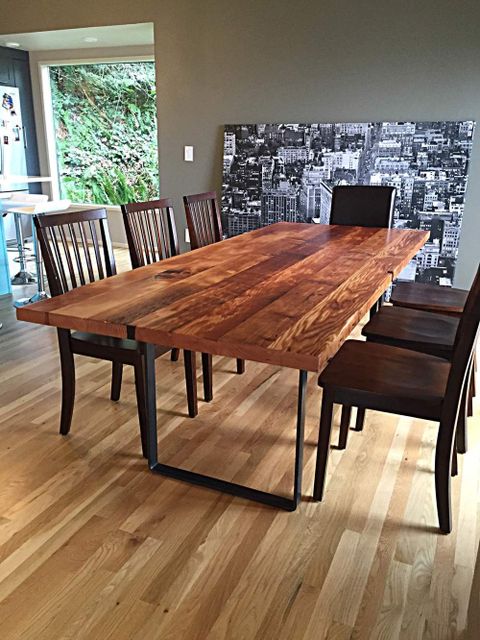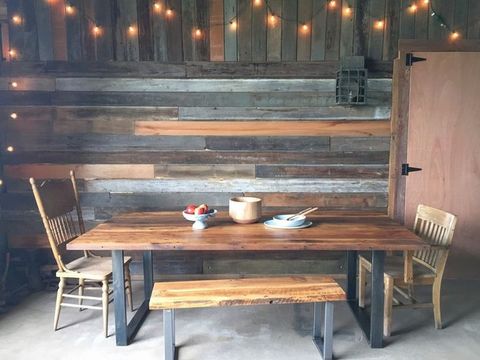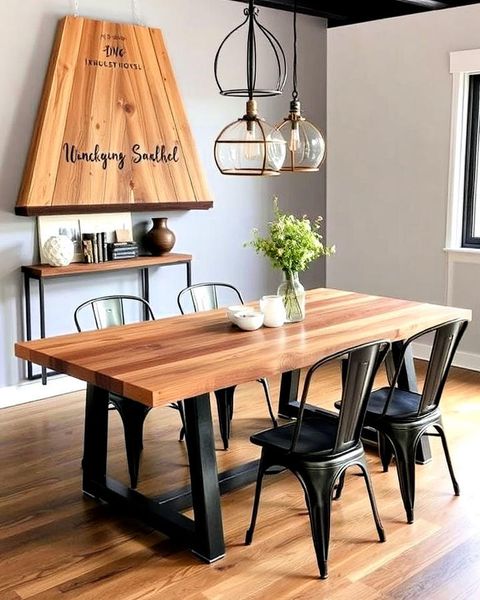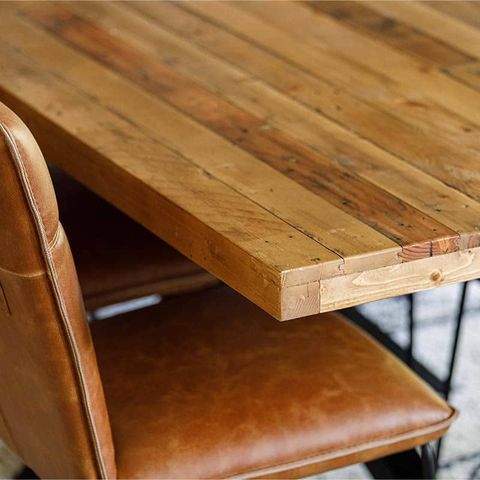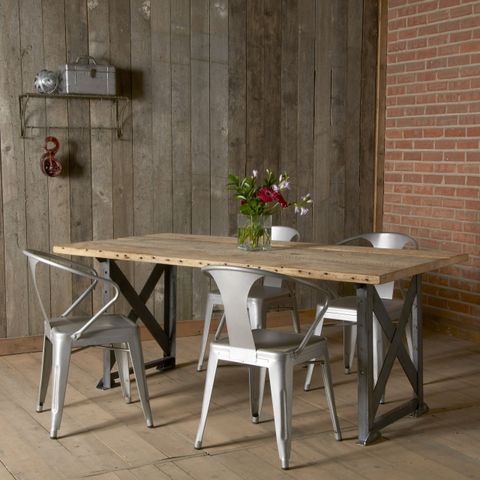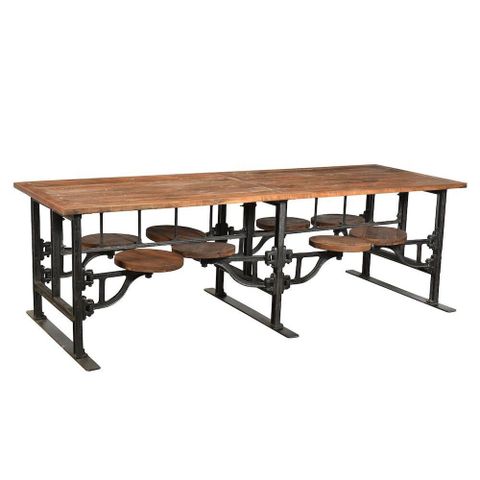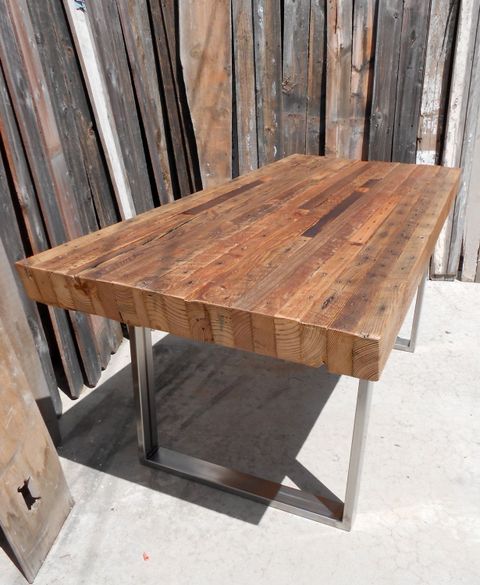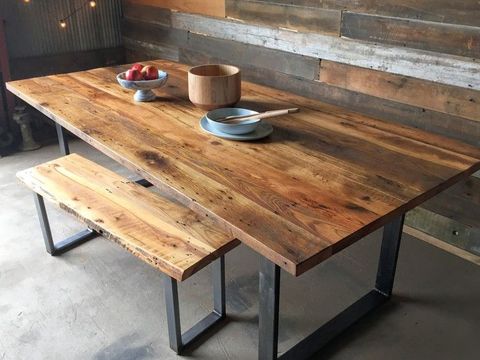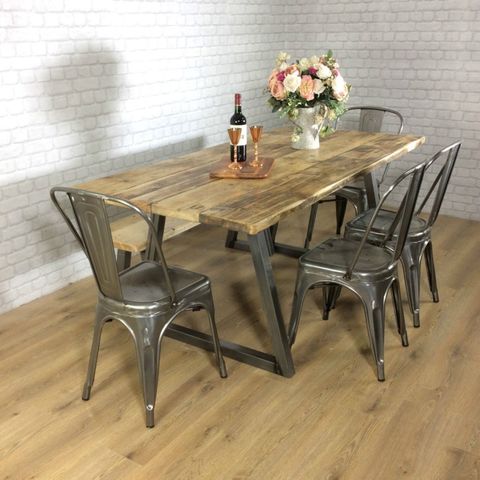There’s something magical about gathering around a table made from wood that once stood tall in someone else’s barn or factory. These reclaimed pieces carry stories, memories, and a warmth that draws people together. What started as a simple furniture choice has blossomed into a movement that brings communities closer.
Picture this: a group of neighbors sitting around a large wooden table that was once part of a 19th-century farmhouse. The grain patterns tell tales of generations past, while conversations flow as easily as the wine being poured. This isn’t just about furniture – it’s about connection. Reclaimed wood tables have become unexpected catalysts for building relationships, creating shared experiences, and strengthening bonds within communities. Whether you’re planning a backyard barbecue or hosting a monthly book club, these tables offer something special that modern mass-produced alternatives simply cannot match. They serve as gathering points where friendships bloom, families grow closer, and strangers become friends.
The Heart of Community Gathering Spaces
Reclaimed wood tables naturally invite people to stay longer and engage more deeply. Their rustic charm creates an atmosphere that encourages conversation and connection. Unlike sleek modern tables that might feel intimidating or sterile, these pieces have character and history that makes everyone feel welcome. The weathered surface seems to whisper stories of previous owners, creating a sense of continuity and shared experience.
When people gather around these tables, they’re not just sharing meals – they’re participating in something bigger than themselves. The table becomes a symbol of community values like sustainability, respect for history, and the importance of bringing people together. Many homeowners report that their reclaimed wood tables have become the centerpiece of their social life, hosting everything from casual family dinners to elaborate holiday celebrations.
Consider how often you’ve seen these tables at local farmers markets, community centers, or neighborhood events. They’re not just decorative – they’re functional community anchors that make spaces feel more intimate and welcoming.
The Storytelling Power of Reclaimed Materials
Each reclaimed wood table holds a unique narrative. A piece from an old barn might have witnessed countless harvest seasons, while another could have been part of a bustling mill operation. These stories create an immediate connection between people who gather around them. When someone asks about the wood’s origin, the conversation naturally expands beyond the meal itself.
This storytelling aspect works on multiple levels. For some, it’s about appreciating craftsmanship that’s no longer common in today’s manufacturing process. For others, it’s about honoring the environmental consciousness of reusing materials instead of discarding them. The table becomes a conversation starter that helps break down barriers between people from different backgrounds.
The physical characteristics of reclaimed wood also contribute to this storytelling power. The nail holes, saw marks, and age-related imperfections aren’t flaws – they’re evidence of the wood’s journey through time. These details create a tactile experience that connects people to both nature and history in ways that perfectly smooth, modern materials cannot replicate.
Many community groups have found that discussing the origins of their tables during gatherings creates deeper bonds among members. It’s not just about the table itself, but about the collective appreciation for sustainable practices and historical preservation.
Sustainability and Environmental Consciousness
In our increasingly environmentally aware world, reclaimed wood tables represent more than just aesthetic choices – they embody values that many people hold dear. Choosing reclaimed wood means reducing demand for new timber harvesting, which helps protect forests and wildlife habitats. It also reduces waste by keeping materials out of landfills where they might take decades to decompose.
This environmental angle resonates strongly with communities that prioritize green living. Many people find that their decision to use reclaimed wood aligns with broader lifestyle choices about sustainability, conservation, and responsible consumption. When families discuss their table’s origins, they’re often reminded of larger environmental concerns and solutions.
The concept extends beyond just the wood itself. Many reclaimed tables are sourced from buildings that were demolished for development projects, giving new life to materials that would otherwise disappear. This approach fits well with the growing trend toward circular economy principles, where resources are reused rather than discarded.
Community gardens, recycling programs, and environmental organizations often feature reclaimed wood tables prominently because they serve as tangible reminders of environmental stewardship. These tables don’t just sit in homes – they become educational tools that spark discussions about climate change, conservation, and sustainable living.
Creating Shared Experiences Through Tabletop Moments
There’s something about gathering around a table that fundamentally changes how people interact. The physical presence of a shared dining space creates a rhythm and structure that encourages conversation and participation. Reclaimed wood tables amplify this effect through their visual and tactile qualities.
The communal nature of these tables – often designed to accommodate large groups – naturally promotes inclusive participation. Unlike smaller, more intimate tables that might exclude some guests, larger reclaimed wood tables ensure that everyone feels part of the group dynamic. The size and presence of these tables signal that this gathering is important enough to warrant a substantial space.
Many communities have discovered that their most memorable moments happen around these tables. Birthday parties, wedding receptions, holiday dinners, and casual get-togethers all benefit from the sense of permanence and tradition that reclaimed wood provides. The table becomes a stage for creating lasting memories while serving as a reminder of the value of shared experiences.
The act of setting up and using these tables also builds community engagement. Many people find that preparing for gatherings around reclaimed wood tables becomes a collaborative activity, involving friends and neighbors in the process of arranging seating, choosing decorations, and planning meals. This preparation phase often generates its own sense of community involvement and investment in the event’s success.
Economic Benefits and Local Business Support
Reclaimed wood tables often support local businesses and artisans in ways that extend far beyond their purchase price. Many of these tables are crafted by local woodworkers, furniture makers, or restoration specialists who have developed skills specifically for working with reclaimed materials. When you buy a reclaimed table, you’re often supporting someone’s livelihood while contributing to the local economy.
This economic impact is particularly strong in communities where reclaimed wood work is a specialty craft. These artisans often combine traditional woodworking techniques with modern design sensibilities, creating pieces that are both functional and beautiful. Their work often involves careful selection and preparation of materials, ensuring each table meets quality standards while maintaining its character.
Local sourcing of reclaimed materials also strengthens regional supply chains. Rather than importing materials from distant locations, communities can often find reclaimed wood from nearby demolished buildings or construction sites. This local sourcing reduces transportation costs and carbon footprints while keeping money circulating within the community.
Many communities have embraced the idea that investing in reclaimed wood tables supports not just individual entrepreneurs, but also helps preserve local craftsmanship and traditional skills. When people choose to invest in these tables, they’re voting with their wallets for businesses that align with their values and community goals.
Design Flexibility and Personalization
One of the most appealing aspects of reclaimed wood tables is their versatility in design and personalization. Unlike mass-produced alternatives that offer limited options, reclaimed tables can be adapted to fit almost any style or space. Whether you want a rustic farmhouse look, a modern industrial vibe, or something that blends traditional and contemporary elements, there’s likely a reclaimed wood table that can accommodate your vision.
The natural variations in reclaimed wood – including grain patterns, color variations, and unique markings – mean that no two tables are exactly alike. This uniqueness allows each table to reflect the personality and preferences of its owner. Some people love the raw, unfinished look, while others prefer tables that have been sanded and finished to highlight the wood’s natural beauty.
The customization potential extends beyond appearance. Many reclaimed tables can be modified or expanded to meet specific needs. Additional leaves can be added for larger gatherings, or sections can be removed for more intimate settings. Some tables even allow for creative modifications like built-in storage or integrated lighting features.
This flexibility makes reclaimed wood tables ideal for communities with diverse needs and preferences. A single table can serve multiple purposes throughout a community – from regular family dinners to special events, from casual meetings to formal celebrations. The adaptability ensures that the table remains useful and relevant over time, reducing the need for frequent replacements or upgrades.
Reclaimed wood tables have evolved far beyond simple furniture pieces. They’ve become symbols of community values, sustainability, and shared experiences that bring people together across cultural and generational divides. These tables don’t just provide a place to eat – they create opportunities for meaningful connection, storytelling, and community building.
Whether you’re considering adding one to your home or helping organize a community gathering, understanding the deeper significance of reclaimed wood tables can enhance your appreciation for their role in fostering human connection. They remind us that the most valuable things in life often come from reimagining what already exists, finding beauty in the past, and creating spaces where people want to linger and connect.
The journey from old barn to dinner table represents more than just a material transformation – it’s a metaphor for how communities can thrive when they embrace both history and innovation, tradition and creativity. These tables continue to prove that sometimes the best way to move forward is to look back at what we already have and find new ways to celebrate it.

